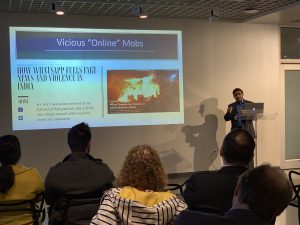COSMOS director and Arkansas Research Alliance fellow Dr. Nitin Agarwal spoke about deviant online behavior at UA Little Rock Downtown on Wednesday, March 13. This behavior includes, but is not limited to, deviant mobs of the Internet, disinformation campaigns, bots, trolls and computational propaganda techniques. Dr. Agarwal presented examples of how the spread of misinformation online affects the real world from fueling hatred that leads to violence to spreading incorrect medical information that will result in health risks. The spread of “fake news” can also influence voters, create confusion during disasters and cause hysteria of the masses.

Deviant online behavior spreads over many platforms. Well-orchestrated cross-media disinformation campaigns can begin as a blog. There, a blogger is able to express their opinion without any censorship. Narratives are framed more effectively on blogs than any other social media platform without being limited to 280 characters. Links to blog posts are then added to attention-grabbing posts published on Facebook, Twitter, Instagram, Pinterest, Reddit and other online platforms that focus on content sharing and user interaction.
Because of the content-rich characteristic of blogs, COSMOS has been developing Blogtrackers, a socio-computational tools to track, monitor, and understand blogs, bloggers and real-time world events. Users can extract insights, such as key influencers of the blogosphere. Through Blogtrackers, COSMOS has been actively working on research studies that are supported by grants from the U.S. Office of Naval Research in the fight against cyber propaganda campaigns and tracked how anti-NATO groups reacted to information released during NATO exercises.
Another COSMOS tool is YouTubeTracker, a tool that can track, monitor, and identify influential YouTube channels and content. Dr. Agarwal spoke about the use of YouTubeTracker during the recent NATO exercise Trident Juncture 2018. What COSMOS researchers observed during the NATO’s Trident Juncture 2018 exercise was a set of highly sophisticated and deeply troubling media orchestration strategies along with adversarial information operation tactics and maneuvers.
“In this day and age of co-programming, where humans program (and train) the systems while systems ‘program’ us by recommending content, algorithmic manipulations pose critical threats to social norms, democratic values, security, and civic discourse”, Dr. Agarwal explained. “In this study, we have provided means to reveal such adversarial operations and suggest ways to tweak algorithms to stem the flow of weaponized narratives. While this is a necessary first step and algorithmic tweaks are needed, they are by no means adequate. What we need is to de-program an entire generation that can only happen by imparting critical thinking skills, media literacy, and equipping folks with right set of technologies that can assist in the fight against disinformation.”
With wide ranging skills including data science, machine learning, AI, computational social science, and new media analysis, team COSMOS is doing just that by developing methodologies to diagnose novel pathologies of online social media and providing publicly available technologies such as Blogtrackers and YouTubeTracker to monitor the new media.
Dr. Agarwal focuses on educating the public and social media practitioners about deviant online behavior. He will be speaking at the NATO Strategic Communication Center of Excellence the week of March 25.
